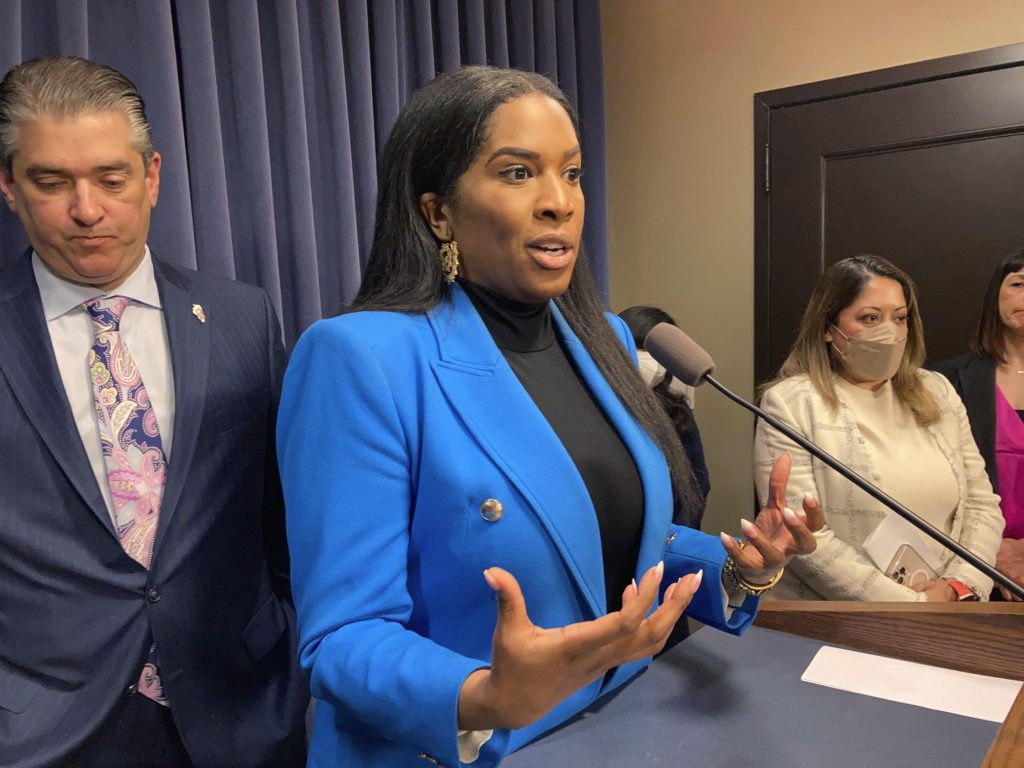
By JOHN O’CONNOR for the Associated Press
SPRINGFIELD, Ill. (AP) — Illinois Democrats outlined anti-crime measures Friday amid pressure from rising violence and Republican critics, promising more in the final days of the Legislature’s spring session.
Four pieces of legislation focus on establishing social-service networks for crime victims, expanding anonymous crime tip lines and a witness protection program and increasing by $185 million funding for programs for young children, teen parents, child care, after-school activities and needs-based college scholarships before a scheduled April 8 adjournment deadline.
Violent crimes have been on the rise nationwide. Democrats additionally have been battered by criticism over police- and bail-overhaul measures they adopted early last year in response to a spate of police-involved shootings. Republican election-year opponents have even blamed that legislation for the rise in crime — even though it hasn’t yet taken effect.
House Deputy Majority Leader Jehan Gordon-Booth of Peoria noted that police accountability remains key while understanding that violent crime has grown from “the divestment that’s happening in many of our communities.”
“We want to meet those needs where they are, but we also are clear, there’s a need for accountability and responsibility,” Gordon-Booth said. “So we want to provide law enforcement tools that look a lot more like a scalpel than an ax.”
Gordon-Booth’s legislation would create pilot programs in East St. Louis, Peoria, Springfield and Waukegan to link crime survivors with social services they need, including mental health, substance abuse treatment and housing.
East St. Louis is lacking in mental health treatment and has no trauma center, let alone a hospital, said Gloria Hicks, whose brother was killed and who serves as St. Louis coordinator for Crime Survivors for Safety and Justice. “This bill will bring us one step closer to protecting the most vulnerable in our greatest time of need.”
Other measures in the package include Chicago Sen. Robert Peters’ plan to create a crime reduction task force to review the latest research, programs that are working and hear expert testimony before reporting suggested solutions by March 2024. It also would create an anonymous cash-for-tips line similar to Crime Stoppers, which Peters said isn’t available everywhere, and a funding stream for a rebuilt violent crime witness protection program.
“Our job here is to be smart on crime,” Peters said. “What we know is that we’re in the midst of a crisis and we’ve got to respond to it.”
Peters is proposing $20 million for witness protection and $1 million for a tip line. Democratic Gov. J.B. Pritzker has proposed $20 million for witness protection in his budget proposal.
Chicago Sen. Celina Villanueva has proposed increasing funding by $185 million, or 4.6%, for programs to help children and teenagers who face poverty, mental health or other issues that could lead to crime.
“Programs that support these initiatives help to reduce crime and tackle inequity and inequality at its source,” Villanueva said.
All contents © copyright 2022 The Associated Press. All rights reserved.




